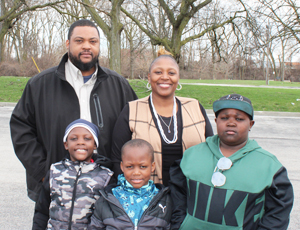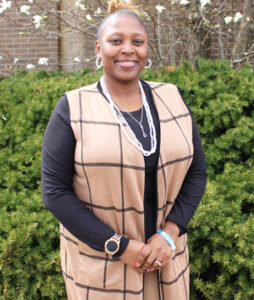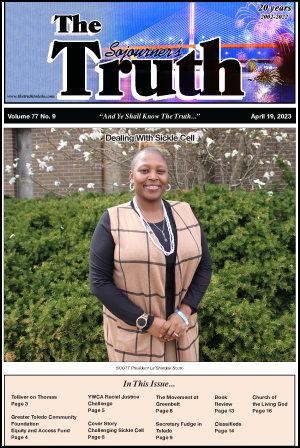
By Asia Nail
The Truth Reporter
In recent years, there is a growing movement to raise awareness and advocate for those living with sickle cell disease, a genetic blood disorder that affects millions of people worldwide. With increasing recognition of the unique challenges faced by individuals and families impacted by this condition, The SCOTT Center has been working tirelessly to improve care, advance research and empower those living with Sickle Cell Disease right here in Toledo.
La’Shardae Scott is the CEO/president of SCOTT, which stands for:
Scott Center for Observation Treatment & Transition, a nonprofit organization dedicated to promoting sickle cell awareness, education and research. “We specialize in facilitating the transition from pediatric to adult treatment,” explains Scott.
La’Shardae Scott, is also a mother of four who found herself thrust into the world of sickle cell disease when her two youngest children were diagnosed with the condition.
“I had to educate myself on the disease to help my boys manage their illness,” she shares. “I had to navigate the complexities of sickle cell disease head on. So that’s what my husband and I did.”
She began to research sickle cell disease, poring over medical journals and books, attending conferences and meeting with doctors and other advocates. “I called a doctor in my hometown of Detroit and was able to set up an internship with him,” shares Scott. “I learned so much, I knew I had to share my knowledge with others.”
Sickle Cell Disease (SCD) is a genetic condition that affects millions of people around the world. For parents of children with sickle cell, the challenges can be overwhelming. The constant hospital visits, the medication schedules, and the uncertainty of the disease can take a toll on families, both emotionally and financially.

This genetic blood disorder affects the structure and function of red blood cells, causing a mutation in the HBB gene, which provides instructions for making a protein called hemoglobin. Hemoglobin is a protein in red blood cells that carries oxygen throughout the body. In sickle cell disease, the mutation in the HBB gene causes hemoglobin to form into a sickle shape when oxygen levels are low. These sickle-shaped cells can stick together and block small blood vessels, leading to reduced blood flow and oxygen to organs and tissues.
“In layman’s terms the sickle-shaped cells in the bloodstream are like tiny saboteurs, wreaking havoc on the body’s delicate balance. They cling to blood vessels restricting the flow of oxygen and causing excruciating pain,” says Scott.
There are several types of sickle cell disease, including sickle cell anemia (SS), sickle cell-hemoglobin C disease (SC), sickle beta-plus thalassemia (Sβ+), and sickle beta-zero thalassemia (Sβ0). Sickle cell anemia is the most common and severe form of the disease and is caused by inheriting two copies of the mutated HBB gene (one from each parent).
Sickle cell disease affects both children and adults. In children, the disease can cause pain crises, anemia, and delayed growth and development. Pain crises occur when sickle-shaped cells block blood flow to organs and tissues, causing severe pain. Anemia occurs when there aren’t enough healthy red blood cells to carry oxygen throughout the body. In adults, sickle cell disease can cause chronic pain, organ damage and an increased risk of infections and strokes.
“I educate individuals, families and administrators and give them the power to make informed decisions around a little-known illness,” says Scott.
In doing so, Scott and her husband Eric fight tirelessly ensuring that every child with the disease now has access to the education and resources they need to succeed. “Back then, there weren’t many resources, so we became the resource —and wrote a book.”
What Dr. Shurney Taught Me explores the life of Emory, a little boy living with sickle cell disease. “It’s a great story and a simple way to help first time people who live with or care for someone with the disease, ” says Scott.
Scott’s passion and dedication certainly paid off. Currently she is a student at the University of Kentucky’s Doctor of Social Work Administration and Leadership program, developing new exciting research around the disease.
“I knew back in 2015 when the boys were diagnosed that I would need to be their biggest advocate,” she explains. “As the mother of two warrior children I decided to change my educational path from secondary education to social work. Best decision I’ve ever made. Now that I’m working on my doctorate my ultimate goal is to continue focusing on my research while creating funding and changing the narrative that sickle cell patients are warriors.”
Scott calls sickle cell patients “warriors” because living with sickle cell disease requires immense strength and resilience. Living with sickle cell can often feel like a constant battle. Patients have to manage their symptoms and treatments, navigate healthcare systems and advocate for themselves in a society that often does not understand their condition. “It takes a great deal of courage and perseverance to live with sickle cell disease,” says Scott. “These patients are real life warriors.”
By referring to sickle cell patients as “warriors,” Scott hopes to highlight the strength and resilience of this community and inspire others to support them. She believes that recognizing the challenges faced by sickle cell patients and honoring their courage can help to reduce stigma and improve the lives of those living with this condition.
Scott is now a top leader in the sickle cell community, advocating for better care and increased awareness. “I create programs and initiatives that provide resources and support to families and children living with the disease,” she says. “I feel a deep responsibility to help not only my own children, but all who need the tools to navigate this chronic illness.”
Scott also recognizes the importance of a holistic approach to care, including emotional support, nutrition, exercise, and stress management. “I incorporate these principles into my training sessions,” she shares. “We also have a support group so everyone feels they have a safe and supportive environment available to them when they need one.”
The Sickle Cell Awareness Toledo or (SCAT) group will meet at the Mott Library on April 20 from 7-8 p.m.
“It’s important for family members to get tested for the sickle cell trait,” explains Scott. “This means they have one copy of the mutated gene but don’t have the disease. People with the sickle cell trait are generally healthy and don’t experience symptoms of sickle cell disease, but they can pass the trait on to their children.” If two people with the sickle cell trait have a child, there’s a 25 percent chance the child will inherit two copies of the mutated gene and develop sickle cell disease.
Family members of a person with sickle cell disease should also be aware of the symptoms and complications of the disease. Sickle cell disease can cause acute and chronic pain, as well as damage to organs such as the spleen, kidneys, and lungs. People with sickle cell disease require ongoing medical care, including regular monitoring, preventive measures, and treatment of complications. It’s important for family members to be supportive and understanding of the challenges faced by their loved one, and to encourage them to seek appropriate medical care and emotional support.
With her extensive educational background and years of experience as an advocate, President Scott is well-equipped for her role and will soon open a physical location. “I’ve been consulting for the past several years and now it’s time to expand,” she shares.
Scott’s journey as a parent of two children with sickle cell disease has not been easy, but she has persevered with unwavering love and determination. Through her own research, advocacy, and support of her children, she has become a beacon of hope for other families dealing with this disease. Her story is a testament to the power of education, resilience, and community in the face of adversity.
You can contact The SCOTT Center on Facebook and by email at LScott@ScottCenterOH.org

